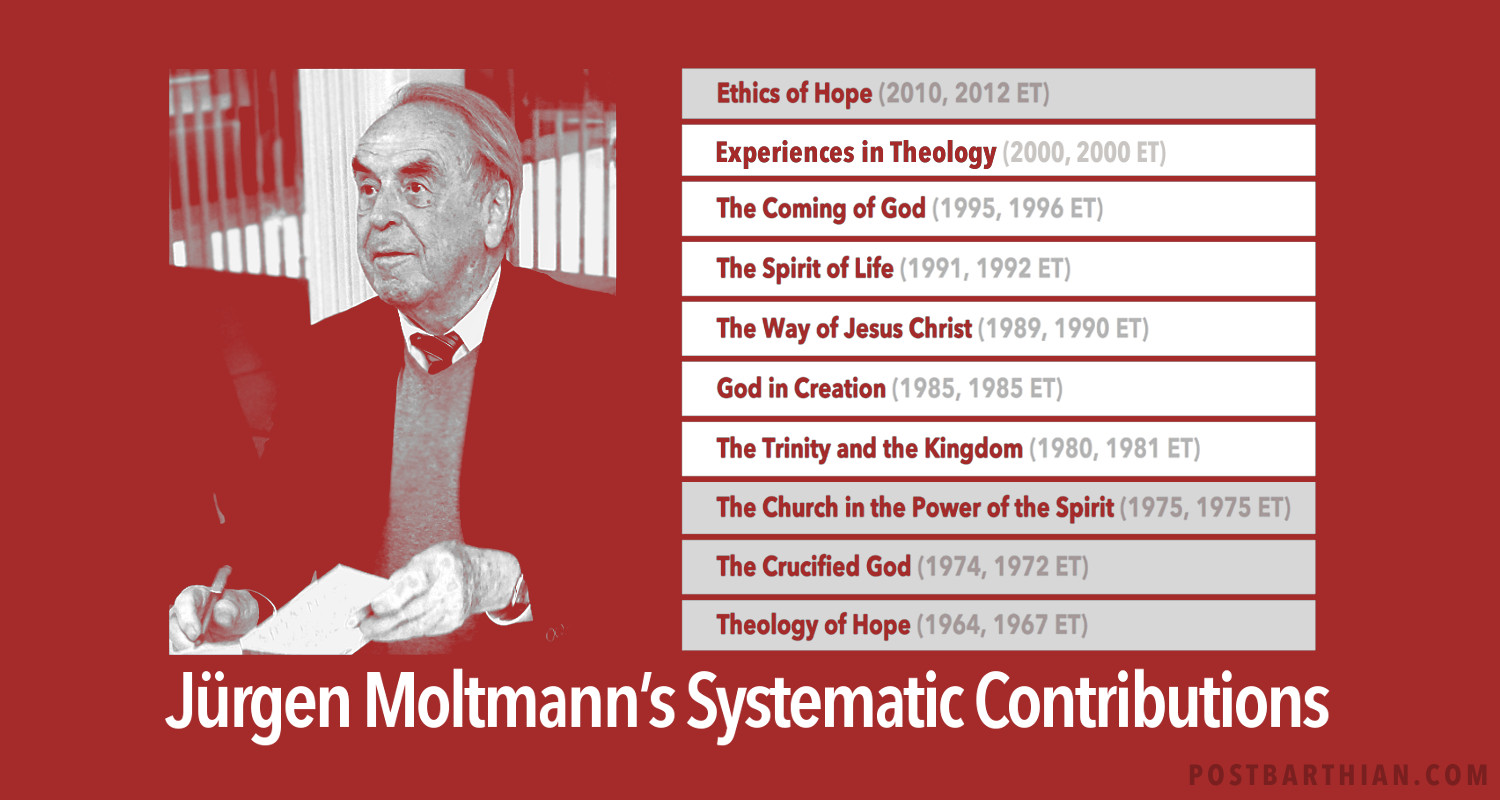 I own shelves of Jürgen Moltmann's books and read everything published with Moltmann's name on it, whether it was written by Moltmann or written about Moltmann.
I own shelves of Jürgen Moltmann's books and read everything published with Moltmann's name on it, whether it was written by Moltmann or written about Moltmann. Unfortunately, the amount of Moltmann books is endless. If you or someone you love is a moltmanniac like me then there is a short list of must-read Moltmann books that every moltmanniac must acquire and read over and over again. And these are—drum roll please—Moltmann's systematic contributions. Most moltmanniacs are familiar with Moltmann first trinity of books—the Theology of Hope, The Crucified God, and The Church in the Power of the Spirit—and although these three books are not technically part of his systematic contributions, they are so similar in importance and content that I often (and others) include them in his systematic contributions (and then it begins and ends with a book on hope). Moltmann's "systematic contributions to theology" specifically refer to six books, consisting of The Trinity and the Kingdom, God in Creation, The Way of Jesus, The Spirit of Life, The Coming of God, Experiences in Theology. I've also included the Ethics of Hope, for the same reason as I included the original trinity of books (also called the original trilogy), even though it is not technically part of Moltmann's systematic contributions. (The Ethics of Hope is basically a part-two to Moltmann's Theology of Hope that he wrote largely because Karl Barth said the Theology of Hope lacked the needed ethical sections that explain how his theology of hope may be practiced in the Christian life.)
Moltmann's systematic contributions are not a systematic theology or dogmatics. Jürgen Moltmann was strongly opposed to writing a summa theology like Karl Barth's Church Dogmatics or Thomas Aquinas' Summa Theologica because he believed these summa were fortress theologies and he consider himself a theological explorer and followed a different theological hermeneutic. In lieu of his own dogmatics, Moltmann wrote (what he called) "systematic contributions" that were not exhaustive discussions of systematic theologies but instead included his own insights into challenging theological problems. (Perhaps Moltmann's systematic contributions may be compared to the essay-format utilized by Karl Rahner's multi-volume Theological Investigations series). For instance, in his book God in Creation, he doesn't rehearse all the classical loci of the doctrine of creation, but instead adds his own unique insights into particular issues that are most urgent for today, such as the ethics of ecology. In these systematic contributions, Moltmann provides a systematic contribution to a particular loci, without being weighed down with all the boring rhetoric typically encountered in other books on the same theological subject matter.
So my advice to every moltmanniac is to purchase all of Moltmann's systematic contributions (including his original trinity) and read them as fast as you can! Many of Moltmann's other books are simplified versions with more information of what he has written in his systematic contributions. Attention has been unfairly skewed towards the Theology of Hope and The Crucified God (and possibly God in Creation), so please, please please, read the other books (maybe first?) and there's no need to read them in chronological order (by publish date) because you may jump into anyone that is quickest and easiest to acquire.
Jürgen Moltmann's Original Trinity
- Theology of Hope (1967); Theologie der Hoffnung (1964);
- The Crucified God (1974); Der gekreuzigte Gott (1972)
- The Church in the Power of the Spirit (1975); Kirche in der Kraft des Geistes (1975)
Jürgen Moltmann's Systematic Contributions
- The Trinity and the Kingdom: The Doctrine of God (1981); Trinität und Reich Gottes. Zur Gotteslehre (1980)
- God in Creation: An Ecological Doctrine of Creation (1985); Gott in der Schöpfung. Ökologische Schöpfungslehre (1985)
- The Way of Jesus Christ: Christology in Messianic Dimensions (1990); Der Weg Jesu Christi. Christologie in messianischen Dimensionen (1989)
- The Spirit of Life: A Universal Affirmation (1992); Der Geist des Lebens. Eine ganzheitliche Pneumatologie (1991)
- The Coming of God: Christian Eschatology (1996) Das Kommen Gottes. Christliche Eschatologie (1995)
- Experiences in Theology: Ways and Forms of Christian Theology (2000); Erfahrungen theologisen Denkens (2000)
- Ethics of Hope (2012); Ethik der Hoffnung (2010)
I would require a series of posts to summarize each of these books, and let me know if you want me to write this series! (Click this post's tags for posts related to each book.) I'd like to add a special thanks to the original Moltmanniac, who inspired this post, and who inspired me to read Moltmann. I recommend reading everything Ben Merritt has written at the http://moltmanniac.com.
Updated August 13, 2018: Corrected header image (added Experiences in Theology) and added a note to the first paragraph explaining why Ethics of Hope is included.
Related: Ethics of Hope, Experiences in Theology, God in Creation, Jürgen Moltmann, Original Trinity, Systematic Contributions, Systematic Contributions to Theology, The Church in the Power of the Spirit, The Coming of God, The Crucified God, The Spirit of Life, The Trinity and the Kingdom, The Way of Jesus Christ, Theology of Hope



August 11th, 2018 - 21:56
A vote here for more Moltmann articles 👋
August 13th, 2018 - 19:46
Thanks! Will do!
August 12th, 2018 - 02:25
Please do more of it!
August 13th, 2018 - 19:47
Okay! Thanks for reading.
August 12th, 2018 - 06:07
Likewise, please write that series!
August 13th, 2018 - 19:46
Alright! I’ll see when I can get started.
August 14th, 2018 - 15:25
Moltmann whole oeuvre sounds too exhausting. But with a guide as per your suggestions it then opens some doors. Yes please.
August 17th, 2018 - 16:03
Okay!
January 6th, 2022 - 16:21
Why do the three early books call “Original Trinity”?